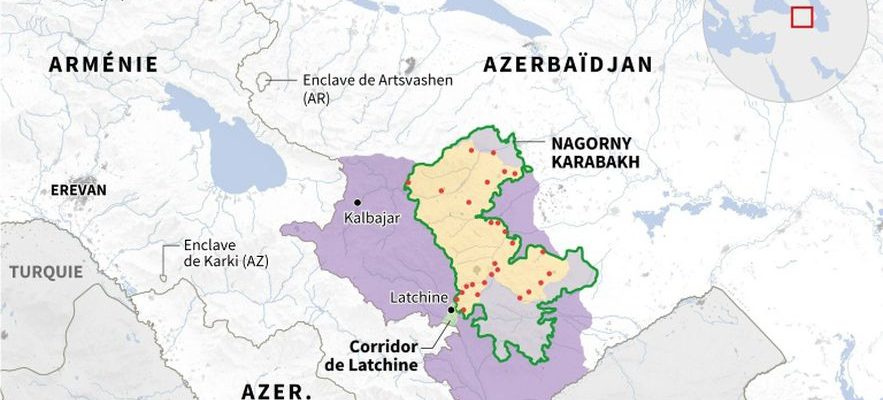If for several months the situation in Nagorno-Karabakh seemed to be getting more bogged down every day, the attack by the Azeri army has raised fears of the emergence of a third conflict in the region. Baku announced this Tuesday, September 19, that it had launched “anti-terrorist operations” and requested the “total and unconditional” withdrawal of its Armenian adversary from this disputed region. A statement that comes just hours after the death of four Azeri police officers and two civilians in the mine explosion.
“Azerbaijan has launched a large-scale military operation against the Republic of Artsakh (the name given by the Armenians to Nagorno-Karabakh, Editor’s note),” the representation of the separatists in Armenia indicated on Facebook, a few days after the Armenian Prime Minister Nikol Pashinian deemed the outbreak of a new war “very likely”.
Just a few minutes after shots were heard in the separatist landlocked region, a first provisional report shows 25 dead, including two civilians. Victims in addition to the 6,500 people who died during the 2020 conflict which lasted one month and 14 days. On the sidelines of the UN General Assembly which is being held in New York, the head of French diplomacy Catherine Colonna notably denounced “the use of heavy weapons, including in inhabited areas”.
No peace agreement concluded since the 1990 war
It must be said that despite Armenia’s defeat against Azerbaijan in 2020, and the ceasefire sponsored by Russia which has since deployed troops in Nagorno-Karabakh, the region remains the scene of numerous tensions , sometimes even going as far as deadly scuffles. More than three years after the end of the conflict, the two belligerents have not sealed any peace agreement to date. And for good reason, the thorny question of Nagorno-Karabakh, under the yoke of the Azeris for three years now, is still not resolved. However, in this conflict which has pitted Armenia against Azerbaijan for more than 30 years, Nagorno-Karabakh occupies a central place.
It all began at the end of the 1980s, against a backdrop of the dislocation of the Soviet bloc. The territory of Nagorno-Karabakh, an integral part of Azerbaijan populated mainly by Christian Armenians, proclaims its independence. A first war then broke out between Armenian secessionists and the Azeri army. The two former Soviet republics of the Caucasus are bogged down in a conflict which is causing the loss of tens of thousands of men and women. Nearly six years after the start of the first hostilities, discussions led by Russia, the United States and France, united within the Minsk group, managed to achieve a ceasefire, which was nevertheless too fragile to guarantee lasting peace between the two belligerents.
Nagorno Karabakh, a disputed region for three decades
© / afp.com/Valentin RAKOVSKY, Sophie RAMIS
The blockade of the Lachin corridor
This is how, after a resurgence of tensions at the beginning of 2020, a second conflict broke out and ended in a crushing defeat for Armenia. Yerevan finds itself forced to cede the Azeri territories adjoining Karabakh, tightening the noose around the separatists. After a short period of calm, tensions with Baku resumed at the end of 2022, when the Azeris blocked traffic in the Lachin corridor, the only road linking Nagorno-Karabakh to Armenia. Due to shortages of food and medicine, the blockade raises fears of the risk of a serious humanitarian crisis.
Initially, Baku assured that the road was blocked by Azeri environmental activists who had come to denounce illegal mines, before finally announcing the installation of a checkpoint. In late June, the Armenian branch of the Red Cross reported that medical deliveries to hospitals in Nagorno-Karabakh, as well as transport of seriously ill patients, had been suspended via the corridor. A few days later, according to Azerbaijani border guards, traffic resumed on this road. But in June, Nikol Pashinian, who denounced a desire for “ethnic cleansing” in the secessionist region, was alarmed by food deliveries “almost at a standstill” and patients prevented from seeking treatment in Armenia.
Launched a few hours after the announcement of the death of four Azeri police officers and two civilians in the mine explosion, the Azeri armed operation raises fears of a return to conflict between the two Caucasian neighbors. Nagorno-Karabakh authorities have called on Azerbaijan for a ceasefire and negotiations. In response, Azerbaijan proposed talks with Karabakh Armenians in the Azerbaijani town of Yevlakh located 295 kilometers west of Baku. The country says it is ready for negotiations if the Armenians give up their arms, even though Prime Minister Nikol Pashinian assures that he has not deployed any armed forces in the region. “The illegal Armenian armed forces must raise the white flag, surrender all weapons and the illegal regime must dissolve. Otherwise, anti-terrorist operations will continue until the end,” said the Azeri presidential administration, echoing its diplomacy which demanded a “total and unconditional” surrender.
